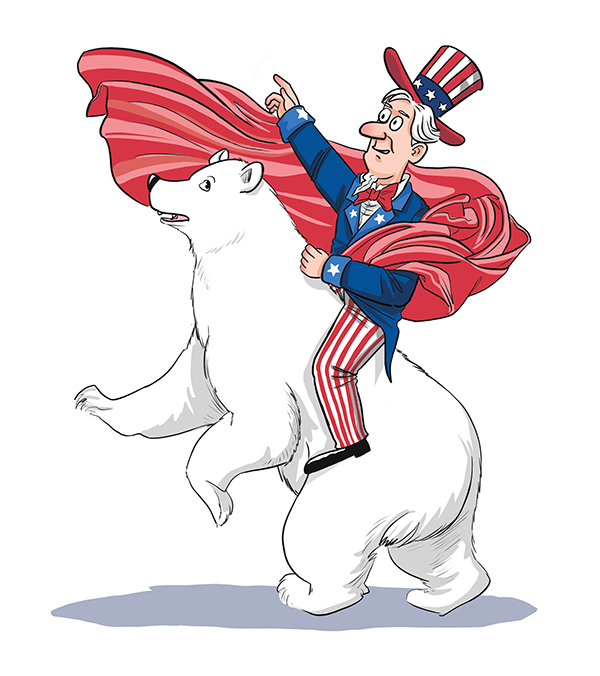Global governance needed for Arctic affairs


Editor's Note: US Secretary of State Mike Pompeo told the Arctic Council ministerial meeting in Rovaniemi, Finland, on Monday that China and Russia pose a growing threat to the Arctic region. Pompeo's remarks come in the wake of an annual report submitted to US Congress that focuses on military developments involving China and includes "China in the Arctic" as a special subject. Why has the Arctic grabbed global headlines? And do China and Russia really pose a threat to the region? Two experts share their views on the issue with China Daily' Pan Yixuan. Excerpts follow:
US claim that China poses a threat to Arctic ludicrous
Zhu Feng, executive director of the Collaborative Innovation Center of South China Sea Studies and dean of the Institute of International Relations of Nanjing University
China has the right to participate in the development of the Arctic, especially because China can help mitigate the effects of climate change on the region in the future, whose environment and fauna are already feeling the disastrous impact of global warming.
China has high stakes in Arctic affairs, as the shipping channel emerging due to melting ice in the Arctic may dramatically cut shipping time and cost between the Atlantic and Pacific.
However, Arctic states do not agree on the management and exploitation of the Arctic's diverse resources. The Arctic states claim sovereignty over the Arctic region while non-Arctic states regard the Arctic as a region open to all countries.
Unlike the Antarctic Treaty System, which came into force in 1961 and allows 53 countries to conduct scientific research and bans military activities on the continent, the Arctic Council is an intergovernmental forum that promotes interactions among its eight members on common Arctic issues. Besides, the council believes in exclusivity and denies voting rights to observer countries and other participants.
China has been involved in the Arctic affairs on the basic principle of "mutual respect, cooperation, win-win result and sustainability". Which makes the US' claim that Sino-Russian cooperation, even in accordance with international treaties such as the UN Charter and UN Convention on the Law of the Sea, pose a threat to the Arctic region ludicrous.
On the contrary, China's participation in Arctic affairs can help promote international governance in the Arctic, which is needed to protect the environmental ecology of the region.
Arctic cooperation must be global in nature
Cheng Baozhi, a senior fellow at the Shanghai Institutes for International Studies
Melting ice in the Arctic will raise sea levels and cause coastal erosion, yet it will also create "new opportunities" for trade and resource exploitation. Apart from Arctic states such as Denmark and Russia, non-Arctic states like China and the Republic of Korea have also made achievements in Arctic research and development.
Given their national interests, however, it is understandable that some Arctic states are reluctant to allow non-Arctic states to explore the region and exploit its resources. But by claiming that China and Russia pose a threat to the Arctic, Pompeo is trying to deny the truth that the US is least interested in participating in global climate governance, as it has withdrawn from the landmark 2015 Paris Agreement and sees the melting ice purely as a commercial opportunity. Worse, the US refused to recognize climate change as a threat to the Arctic, which prevented the Arctic countries from mentioning "climate change" in a joint statement they signed at the Arctic Council meeting in Finland.
The development should prompt the Arctic Council to realize that cooperation with non-Arctic countries is necessary to protect the region, by commissioning only eco-friendly infrastructure construction. With no right to vote in the Arctic Council and restrictions on their projects, non-Arctic countries, especially many European Union states, are demanding that the council adjust its structure and become more inclusive in order to make Arctic governance more efficient.
That quite a few bilateral and multilateral cooperation mechanisms and organizations such as the International Maritime Organization, the UN Framework Convention on Climate Change and the UN Environment Programme can exercise influence in Arctic affairs shows the growing trend of international governance in regional affairs.
The remarkable technological achievements many non-Arctic countries have made in polar operations will help them contribute more to Arctic governance if the Arctic Council were to become more inclusive in nature. And through its proposal of "Polar Silk Road", China would like to play an active role in not only developing but also protecting the Arctic.
The views don't necessarily represent that of China Daily.

































